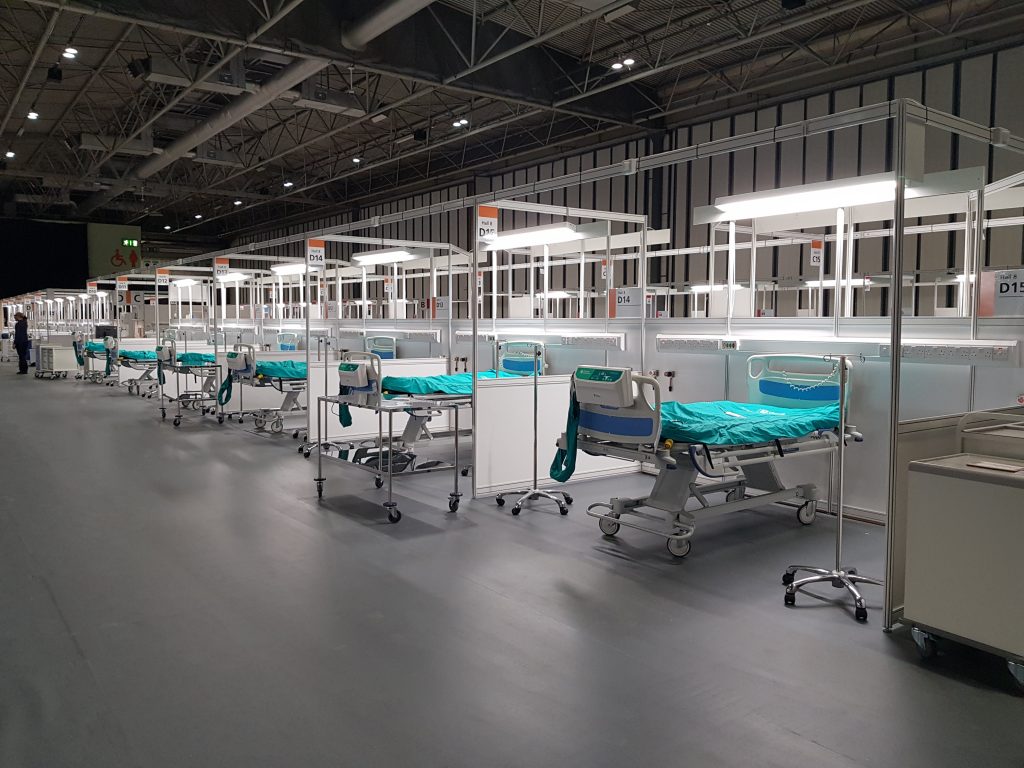FIDIC’s new Covid-19 Webinar Series 2021 launched this week with an event looking at the lessons to be learned for the construction sector from how health infrastructure has performed during the Covid pandemic, writes FIDIC communications advisor Andy Walker.
The webinar “Has health infrastructure taught construction a lesson?” on 2 February 2021 was attended by 349 people and was moderated by FIDIC chief executive Nelson Ogunshakin. The speakers included Ann Kerr, Mott MacDonald’s managing director for Greater China, Ben Coxon, health industry leader at Aurecon, writer and consultant Kiri Parr, American Council of Engineering Companies vice president for private market resources Erin McLaughlin and FIDIC head of economic and strategic policy, Graham Pontin.
First speaker, Ann Kerr, Mott MacDonald’s managing director for Greater China, highlighted three key areas to think about during the current environment - construction programme, construction costs and designing in resilience. “Can we achieve construction at a rate that was achieved pre-Covid in the future?” Kerr asked, who also wondered whether construction costs would rise in a situation where post-Covid measures might make it more challenging to work effectively as a result of ongoing concerns and restrictions on travel and office working. Looking ahead, “Necessity is the mother of invention,” she said which would lead to more innovative solutions being brought forward by the industry which would assist in the global effort to combat the pandemic.
Ben Coxon, health industry leader at Aurecon said there was a need for more flexible construction that could accommodate change in the health sector and that meant that the construction sector needed to be nimbler and more flexible to adapt to that. “Covid can accelerate the changes taking place in our industry especially in the area of digital tools,” said Coxon. The use of digital twins would increase going forward, said Coxon and bring new opportunities for the industry. He also said that there were also significant learnings for the industry to draw from other sectors that had embraced digital and risk to improve performance and their supply chains. “Underpinning everything should be a focus on global wellness and people which should guide everything that we do,” said Coxon.
Writer and consultant Kiri Parr made the point that the construction sector and indeed society was having to deal with complex and unpredictable events and while these could be prepared for in general terms, the specifics of addressing them was complicated. She highlighted a number of health projects in Australia that had been very challenging and delivered inefficiently and highlighted the importance of working with good experts and learning lessons from previous projects where things may have gone wrong. “I can’t stress how important it is to work with good people who can learn from their and others’ experiences on projects and bring challenges and problems to the team early so they can be addressed,” she said.
American Council of Engineering Companies vice president for vice president for private market resources Erin McLaughlin said that the task in the US when the pandemic first hit was to shore up health infrastructure and now the focus had turned to rolling out the vaccine. McLaughlin reflected on how the pandemic had affected health trends in the US, highlighting that ‘tele-health’ (doctors’ consultations via phone or digital) had exploded from 14,000 a week to 10 million a week. “This will change how health facilities are designed and delivered and what construction professionals will need to provide,” she said. Such trends were likely to be long lasting, said McLaughlin and the industry needed to prepare for some big changes in how healthcare is delivered in the future. “In particular, the demand for accommodation for the life sciences sector was also increasing massively and office providers were having to look at how they converted existing space to accommodate that,” she said.
FIDIC head of economic and strategic policy, Graham Pontin, made the point that lessons needed to be learned from global spending trends on healthcare facilities that had not necessarily kept pace with need in the years before the pandemic hit. He also said it was important to value human capital as well as facilities, citing the example of the Nightingale emergency hospitals in the UK that had hardly been used because of staffing issues. “We also need to look at some of the ongoing and long-term effects of the pandemic,” said Pontin. “Dealing with the effects of ‘Long Covid’ is expected to cost around $300bn a year and it’s clear that resilience is far cheaper than pandemics,” he said.
Pontin also stressed that the danger of vaccine nationalism needed to be avoided because the cost of not vaccinating the entire world will be massive in monetary terms as well as health. “We also need to give more consideration to the UN sustainable development goal number 3 on ‘Good health and wellbeing’ and maybe ask, in the light of the pandemic whether we shouldn’t bring the target date for this forward to 2025”.
Closing the webinar, FIDIC president Bill Howard said that the concept of identifying problems early was crucial and the earlier that issues were identified the more could be done to address them. “The world has changed and is changing in different ways and this will bring opportunities, especially in the digital sphere,” said Howard. “With Zoom, Teams and other technologies now widespread, we can bring expert knowledge to bear without even having an expert in the room!”
The next FIDIC webinar is Improving diversity and inclusion in the engineering industry which takes place on Tuesday 9 February 2021 at 12 noon CET. Please register your place as soon as possible as another large turnout is expected for this event.
View a recording of "Has health infrastructure taught construction a lesson?" webinar on YouTube link below.







